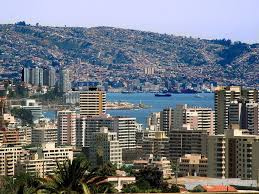What is the origin of the name Valparaíso?
What is the origin of the name Valparaíso? Valparaíso, a vibrant port city located along the Pacific coast of Chile, holds a fascinating history behind its name.
The origins of the name “Valparaíso” date back to the 16th century and are tied to both geographical features and cultural influences.
Its name is both a reflection of the natural landscape and a testament to the influence of European explorers who shaped the history of this coastal city.
As one of the most iconic cities in Chile, Valparaíso’s name resonates with a rich cultural heritage. The city’s origins are linked to both Spanish colonial expansion and the local geography.
The name itself is a blend of geographical significance and cultural homage, connecting the city to broader historical events. But how exactly did Valparaíso come to be named? Let’s explore its intriguing origin.
The Spanish Influence in Naming Valparaíso
The name “Valparaíso” is believed to have Spanish roots, with a historical connection to a place in Spain. The name was likely inspired by a valley near the city of Valencia, Spain.
The full name, “Val paraíso,” translates to “Valley of Paradise” in English. The Spanish conquistadors who arrived in the Americas in the early 1500s found the valley’s natural beauty striking.
The landscape of the area, with its surrounding hills and coastal vistas, reminded them of the scenic valleys in Spain, particularly one near Valencia called “Val paraíso.”
They chose to name the bay after this idyllic Spanish location, a tradition of many explorers and settlers who named new territories after familiar places.
The Role of the Early Spanish Explorers
When the Spanish explorers arrived on the Chilean coast, they sought to map and establish new territories. The choice of Valparaíso as a settlement point was likely influenced by both its strategic location and natural beauty.
The city of Valparaíso, in particular, was favored for its sheltered bay, making it a perfect natural harbor for ships.
Spanish explorers, who were accustomed to coastal cities back home, quickly recognized Valparaíso’s potential for trade, military operations, and settlement. As such, the name “Valparaíso” was applied to the bay and surrounding area to mirror the places they had known in Spain.
The area was settled by the Spanish in the mid-1500s, though it wouldn’t gain the prominence it holds today until centuries later.
The Geological and Geographic Influence
While the name Valparaíso is believed to have Spanish origins, it also reflects the geographic features of the region. The city’s natural landscape plays a key role in understanding why the name was so fitting.
Valparaíso sits in a sheltered bay surrounded by steep hills and rocky outcrops, which offer a dramatic, picturesque view.
The valley-like formation of the region’s geography is a key element in the city’s name, as the term “val” refers to valley in Spanish.
The word “paraíso” translates to “paradise,” further emphasizing the city’s natural beauty. The combination of these elements makes sense both culturally and geographically, as the bay appeared to be a literal “valley of paradise” to the early Spanish settlers.
The City’s Early Settlement and Growth
Once the city was officially named, Valparaíso began its slow rise as a significant settlement. As the Spanish colonized more of Chile, the city became a key center for trade, military, and maritime activity.
By the early 1800s, Valparaíso had evolved from a quiet bay into one of the most important ports in South America.
As the Chilean economy grew, so did the importance of Valparaíso as a trading hub. In the mid-1800s, with the opening of the Panama Canal, Valparaíso became even more critical to international shipping, drawing both European and American attention.
Despite its relatively modest beginnings, the city’s name would come to symbolize Chile’s economic and cultural progress.
The Evolution of Valparaíso’s Identity
The name Valparaíso came to symbolize not just the natural beauty of the region but also the city’s emerging identity as a multicultural, maritime city. As international trade flourished, the city became a melting pot of cultures.
In the 19th century, Valparaíso’s port welcomed immigrants from Europe, Asia, and the Americas. These new arrivals contributed to the growth of the city and its transformation into a bustling cosmopolitan center.
Valparaíso’s name, once merely a geographic designation, evolved to reflect the diverse peoples and cultures that inhabited the city.
The legacy of these immigrant groups can still be seen in the architecture, cuisine, and traditions of the modern city.
The Role of Valparaíso in Chile’s National Development
Valparaíso played a crucial role in Chile’s development during the 19th and early 20th centuries. As the country’s primary port, it became the economic and cultural heart of Chile.
The city’s role as Chile’s gateway to the world allowed it to be at the center of the country’s development. From the bustling port, goods were shipped to and from Europe, North America, and Asia.
Valparaíso also became an important political center, as it was home to the country’s first national congress and a key location for discussions of independence. The city’s name came to symbolize not only natural beauty but also economic and political progress.
A Name with Lasting Significance
The origin of Valparaíso’s name continues to hold significant cultural and historical meaning for both the city and its people. It reflects the deep connection between geography, culture, and identity in Chile’s history.
Today, Valparaíso’s name still evokes a sense of pride for its residents and a symbol of the city’s natural splendor. As a UNESCO World Heritage Site, the city’s history and its name are preserved for future generations.
The name “Valparaíso,” which has stood the test of time, is a reminder of both the region’s historical legacy and its continued significance in Chilean culture.

